Last Tuesday, April 3 was the Republican primary in Wisconsin, and Professor Lowe charged us with finding a story. Unsurprisingly, expectations on campus were low for the primary, with very little discussion or information available on campus.
Marquette College Democrats attempted to get the word out by tabling outside the library and encouraging students to vote-- no matter who they voted for. College Republicans were virtually invisible on campus the same day, despite the fact that it was a Republican primary. I investigated further, and you can read the full story here. Standing outside the Alumni Memorial Union, the voting location at Marquette, it appeared that very few students were interested in the election, and did not vote. Some of it was dues to the Voter ID Law confusion, some of it was due to apathy and some of it was due to the location of the polls. My photo journal focussed on this-- find
0 Comments
Old school journalism may be dying, but Mike Gousha is thriving as the elite open-minded journalist in Wisconsin.
After years of being a political reporter and anchor at the Milwaukee NBC network, Gousha said he “grew disillusioned,” and announced his resignation in 2006. Soon there after, Marquette Law School Dean Joe Kearney approached Gousha about continuing with serious journalism. Gousha accepted and in 2007 began his time as a distinguished fellow in law and policy. Gousha informed our class that this switch positioned him to be the moderator for serious, thoughtful and challenging discourse within the region. His On The Issues with Mike Gousha invites newsmakers and policy shapers to discuss topics pertaining not only to the city of Milwaukee but also to Wisconsin as a state. He has hosted everyone from Rev. Scott R. Pilzrz, S.J, President of Marquette University to Rep. Paul Ryan of Wisconsin. This has broken ground for numerous political debates, in what Gousha hopes to “be a force for public good.” In 2008, Gousha returned to anchoring television when he began producing a Sunday morning show called Up Front with Mike Gousha. Gousha explained it as a forum to “talk about the issues of the day—not necessarily a place for screaming and yelling.” Up Front and On The Issues have given space for smart and interesting conversation and discourse in a truly bipartisan way. The synergy between the two forums has allowed for Gousha to focus on the specific goal of thoughtful and civil conversation. Civil debate, Gousha commented, has become lost art in current television news, but he believes there still needs to be a place for it in current journalism. “I don’t think my job is to be a prosecutor,” Gousha said. “Facts that are shaped to form a political philosophy—that troubles me. These cable news anchors are the new school political pundits and are not practicing journalism.” Indeed, Gousha’s point of view is refreshing in a world of 24-hour cable news networks dominating the story, with politicians trying to appease them and cater to their critiques. Blurring the line between entertainment and news is dangerous and ineffective—and affirming people, as Gousha said, is not informing them. Gousha’s non-partisan views were inspiring, and I left Thursday’s class feeling pumped up about the still evident good in the field. After a weekend, however, and a tad bit of cynicism, I am distraught that while experienced Gousha could make a change in presenting issues, novice journalists do not have such a luxury. We live in a polarized time—which is troubling. Even more troubling: if we don’t take a side, we could easily be pushed aside. 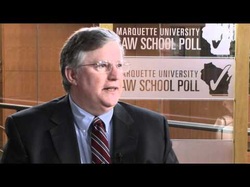 "Polling is merely an instrument for gauging public opinion. When a president or any other leader pays attention to poll results, he is, in effect, paying attention to the views of the people. Any other interpretation is nonsense," so stated George Gallup, a pioneer in the American polling industry.
Charles Franklin seems to agree. Franklin, a visiting professor at Marquette University and co-founder of Pollster.com has been in the polling field for years, working on national and local elections, as well as with private polling. Currently working on the politically independent Marquette Law School Poll, Franklin is developing questions and polling techniques to shed light on the heartbeat of Wisconsin politics in this election year. In speaking with my journalism class this afternoon, Franklin spoke of his work in policy polling and the implications of the latest round of law school polling. Calling political polling the latest form of beat journalism, Franklin echoed Gallup's words, stating that while with every political poll "at least one party will be unhappy with the results and contest it [for the most part] pollsters and political counterparts want fair and non-biased polling, because otherwise it wouldn't do much good." In order to create as impartial a poll as possible in order to return the most accurate results, Franklin forms specifically worded questions and uses creative statistical analysis in interpreting the results. With the creation of Pollster.com, polls were viewed in the aggregate to learn of polling trends instead of relying solely on the latest poll to indicate the country's mood. Franklin said that aggregating polls prevents using "grossly misleading polling data," by looking at the trends of multiple polls. "Aggregate polls allow [pollsters] to pull out the signal from the noise and present it in an effective way," Franklin said. Since The Huffington Post purchased Pollster.com in 2010, Franklin has continued polling. He came to Marquette in 2011, and has been working on making the Marquette Law School Poll the premiere poll in the state. Polling is conducted about once a month concerning a wide range of issues in order to determine what is shaping public opinion. Each survey interviews 700 registered voters, chosen at random from every phone number (including cell phones) in the state. Questions are formulated strategically to be non-partisan in nature, unlike interest group-sponsored polling, which phrases questions in ways to strategically support their case without being factually wrong in order to drive home their desired point. The Marquette Law School poll focusses on registered voters, chosen at random from a phone bank in which every phone number in the state is eligible. About 15 percent of respondents in each poll are newly-registered voters.By using phone polling instead of online polling, the results are more statistically sound. This is because online polling is entirely based on volunteer samples and thus is not random at all-- which Franklin says is fundamental to the science of voting. March poll results will be released next week, and I will do a follow-up blog to discuss the outcomes. Tuesday brought relief to the Romney campaign after the Michigan native won his home state, as well as the Arizona primaries. Romney may be excited about his victory, but I am excited that the race is finally receiving coverage in the Philadelphia news market-- better late than never!
This was the first campaign stop that Philly.com covered extensively with live blogs, multiple articles and the usual AP stories. The best part about Philly.com's site is that the way they cover local politics in regards to the national election. The Inquirer especially focuses on the importance of the race locally, but this is a new development on the site. One article discusses the opening of an Obama campaign office in Philadelphia, while another talks about the GOP race happenings and how it will affect the race in Pennsylvania. 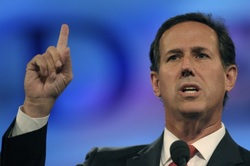 In a surprising change in the race for the Republican candidacy, Rick Santorum won the Minnesota, Missouri and Colorado caucuses. In an unsurprising continuation of lacking coverage, Philly.com did little reporting on Tuesday night.
Most news from the elections that Philly.com did report came from the AP wire. However, Philly.com did tweet some updates. The Missouri win means virtually nothing, as it will not give Santorum any delegates. The wins in the other two states, however, means Santorum now has 70 delegates. Santorum was overjoyed during a speech to supporters in St. Joseph, Mo., saying "Conservatism is alive and well in Missouri and Minnesota!" These are the first wins for Santorum since he narrowly won the Iowa caucus, a decision made after-the-fact. Mitt Romney, the Republican front-runner, was dropped to third in Minnesota, raising questions about his campaign. While running in 2008, Romney won both Minnesota and Colorado. Undoubtedly, these wins mean for a much more intense race between the four candidates as the campaign continues. 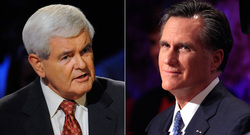 After losing to Newt Gingrich in the South Carolina primary, Mitt Romney came back strong in Florida, winning 47 percent of the vote. Gingrich, on the other hand, only got 27 percent of the vote, a disappointing showing for the former Speaker of the House.
Philly.com did a much better job of covering this race than the South Carolina race, even sending political reporter Thomas Fitzgerald to the Sunshine State. Without live tweeting, however, there was a bit of a delay in the exit polls report. Philly.com also covered the standard AP wire stories and had a few blog posts on the race. According to Fitzgerald, Romney won "virtually every voter group, except those who describe themselves as 'very conservative.'" Gingrich's concession speech did not sound like he had given up. "We are going to contest every place, and we are going to win," he said. An especially helpful website while learning about the results of the race is Politico's 2012 section. Philly.com covered the Florida debate on Thursday by sending politics reporter Thomas Fitzgerald into the fray. Immediately following the debate, mostly between Gov. Mitt Romney and former Speaker of the House Newt Gingrich, Fitzgerald posted a wrap-up on the website. Philly.com did not do very much Tweeting about the debate, however, and since I was not at home to watch, I got the majority of my information in real time from the New York Times, CNN and The Washington Post, which was live-chatting the debate.
From what I gathered before reading Fitzgerald's article, the high stakes debate was an intense battle between the two front-runners, and it will have an effect on the state's primary. At one point, Romney and Gingrich argued directly over involvement in Fannie Mae and Freddie Mac investments. The sparring began after moderator Wolf Blitzer inquired about remarks Gingrich had made earlier in the week questioning Romney's finances. After Gingrich tried to redirect the question, Blitzer continued the questioning, preventing Gingrich from the tactics he used in the South Carolina debate. However, after watching snippets of the debate, it was clear that the candidates were fully in control of the rhetoric, often giving mini-speeches instead of responses. Rep. Ron Paul and Rick Santorum were even able to contribute freely, although this is a race between Gingrich and Romney in the panhandle state. Last night, President Barak Obama delivered his third State of the Union with a confidence and vigor last seen during his 2008 campaign. It excited many of the national news sites into a stupor of live-Tweets and podcasts, yet many regional papers, including Philly.com, were less interested in covering the annual speech.
The Philadelphia news outlet covered the speech in detail the next day, with many AP stories and blogs. Yet the night of, the site was rather quiet, with rare updates and a delayed report after the fact. Other sites, like the New York Times and the Washington Post did a much better job of reporting while the speech was taking place. I found myself following their Tweets and updates more than Philly.com's, although The Huffington Post truly dominated my Twitter feed. I am impressed after watching President Obama deliver the nearly hour and a half long speech. He was incredibly charismatic, his emphasis was defiant and he played party lines to his advantage, at one point even getting a smile out of House Majority Whip Eric Cantor when he told Congress to "pass the payroll tax cut without delay." 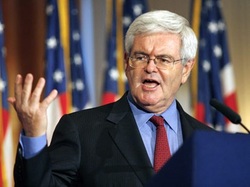 Philly.com covered the South Carolina primary in detail this weekend, although the issue garnering the most coverage was legendary football coach Joe Paterno’s death. Using AP stories and a few op-ed pieces, Philly.com focused on Newt Gingrich more than any other candidate prior to his victory over Rick Santorum and Mitt Romney.
In the week prior to the primary (and Paterno’s death), coverage was more detailed, especially for Gingrich and Romney. Gingrich made headlines when his ex-wife alleged that he had approached her with the idea of an open marriage. Thomas Fitzgerald, an Inquirer politics writer, wrote a column documenting Gingrich’s response—and attack against media—to the question posed during the debate. Ultimately, Gingrich’s approach during the debate must have worked since he won the primary with 41 percent of the vote. This is surprising since Gingrich’s campaign has been fluctuating between disaster and victory throughout this election cycle. Gingrich’s recent success will prove to be troubling for Romney and Santorum now, with the Republican nomination a total toss-up for the November presidential election. On a lighter note, The Washington Post had some fun with the news of Gingrich’s victory, using a picture of President Obama laughing under a headline declaring Gingrich’s win—the picture went with a different story, but the point was made that the results were at once suprising and brought a sense of relief to President Obama’s campaign. For my Seminar in Journalism class, I will be covering the reporting of Philly.com, the website featuring news from both The Philadelphia Inquirer and The Daily News. Since it is two separate newspapers with one active site, the amount of news produced is immense and the organization of the website is essential.
The Inquirer is printed seven days a week, and according to the Audit Bureau of Circulations it is the 11th most circulated newspaper in America. The Daily News is also published seven days a week, but it is in a tabloid form. It is currently published as an edition to The Philadelphia Inquirer. Philly.com provides full coverage for local and regional news, including sports, entertainment, business, and lifestyle. More of a regional news source than national source, Philly.com focuses on news for Philadelphia and South Jersey. Because of this, much of the site has AP coverage regarding the national GOP presidential nomination. The website is a little difficult to manage at first, but the homepage covered important and relevant stories for the region; Joe Paterno’s recent death had a hold on coverage over the weekend. The threshold the site had for multimedia was standard-- not too many exciting practices or innovative video were featured. Although the site had a primary focus on regional happenings, I did not notice a bias with either of the papers’ coverage on political happenings at first glance. I will continue to explore and critique Philly.com’s political coverage throughout the upcoming semester. |

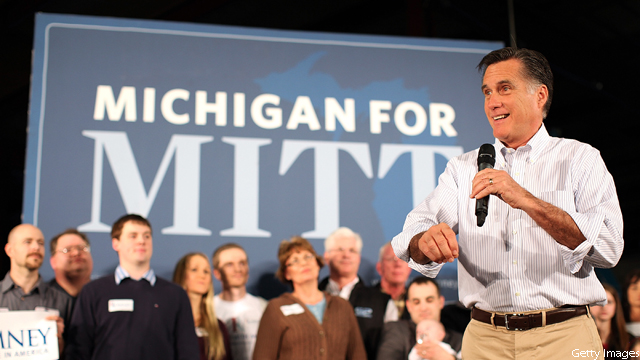
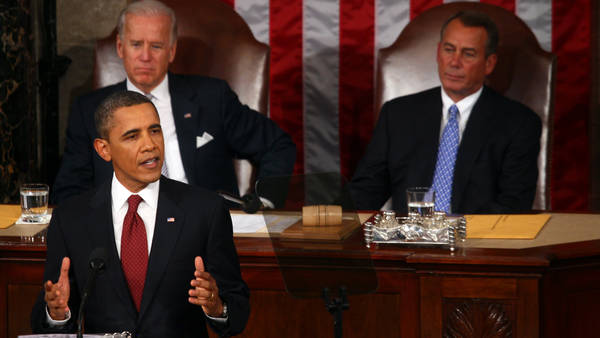
 RSS Feed
RSS Feed